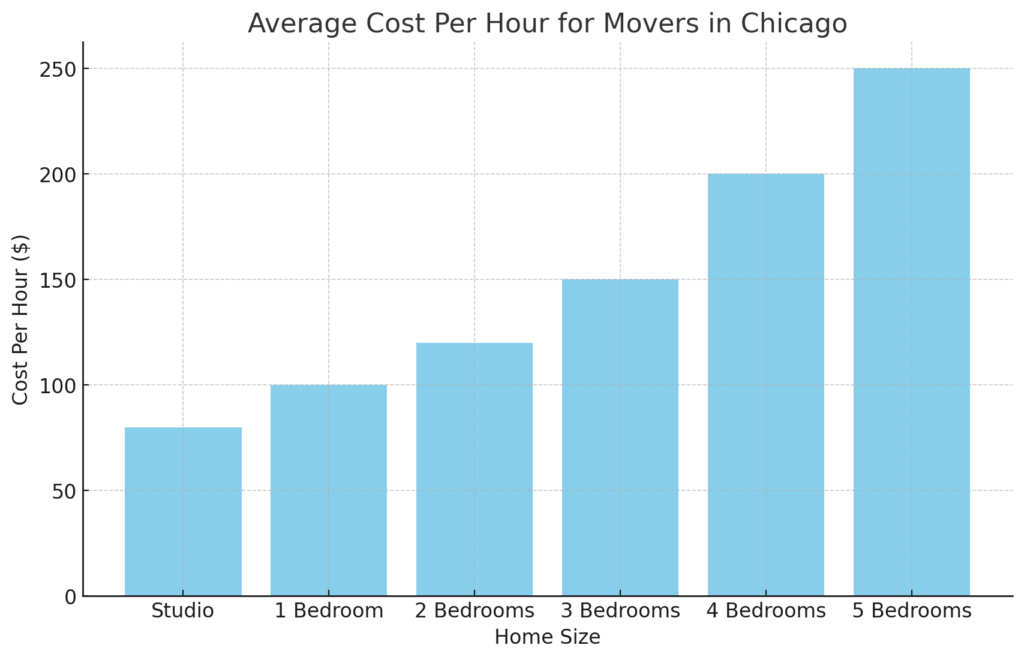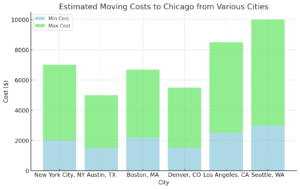Discover the average cost of movers in Chicago and make your move stress-free!
Moving can be both exciting and stressful, with lots of tasks, paperwork and costs involved. One of the biggest expenses you’ll face is hiring professional movers.
This article will give you an idea of the average cost of hiring movers in Chicago, the factors that affect these prices and tips to help you save money on your move.
How Much Do Movers Cost in Chicago?
Planning a move in Chicago? Here’s a breakdown of moving costs based on home size.

The cost of movers in Chicago mainly depends on how far you’re moving and how much you need to transport. For local moves within 50 miles, the average cost can range from $300 to $1,500.
Below is a breakdown of typical moving costs based on the size of your home:
| Home Size | Average Total Cost ($) | Cost Per Hour ($) | Number of Movers |
| Studio | 300-600 | 80-100 | 2 |
| 1 Bedroom | 400-800 | 100-120 | 2-3 |
| 2 Bedrooms | 600-1,000 | 120-150 | 3-4 |
| 3 Bedrooms | 800-1,500 | 150-200 | 4-5 |
| 4 Bedrooms | 1,000-2,000 | 200-250 | 5-6 |
| 5 Bedrooms | 1,500-3,000 | 250-300 | 6-7 |
How Much Does it Cost to Move to Chicago?

Moving to Chicago, especially from cities far away can get expensive due to the distance and extra labor involved. Here’s a quick look at the estimated costs for moving to Chicago from different cities:
|
From City |
Estimated Cost |
|
$2,000 – $5,000 |
|
|
Austin, Texas |
$1,500 – $3,500 |
|
Boston, Massachusetts |
$2,200 – $4,500 |
|
$1,500 – $4,000 |
|
|
$2,500 – $6,000 |
|
|
Seattle, Washington |
$3,000 – $7,000 |
Moving to Chicago can be quite a large expense but there are ways to reduce costs. For example, using services like Chicago Movers Near Me allows you to compare prices from different moving companies, check reviews and get estimates for how much it will cost to move your belongings. This can help you make a more budget-friendly decision.
Factors That Affect Moving Costs in Chicago
The cost of hiring movers in Chicago depends on several things. Here’s a breakdown of the key factors:
- Home Size: The bigger your home, the more items you likely have to move which increases the cost.
- Distance: Moving to a different neighborhood within Chicago is cheaper than relocating to another state.
- Moving Supplies: Costs for boxes, bubble wrap and tape can add up. Some moving companies include these in the price, while others charge separately.
- Packing Services: If the movers pack your items for you, it will raise the overall cost.
- Travel Time: Movers’ travel time from their location to your home and then to your new destination is usually included in the final bill.
- Season: Moving in the summer tends to cost more because it’s a busy season for movers.
- Specialty Items: If you have things like pianos, safes or artwork it may cost extra due to the special care and equipment needed.
- Storage: If you need your items stored by the moving company, you’ll have to pay storage fees.
- Stair Fees: Some movers charge extra if they have to carry your items up or down stairs which is common in older Chicago buildings.
- Insurance: Basic insurance may be included but if you want full coverage, that will cost extra.
- Long-Carry Fee: If movers have to carry your items a long distance from the truck to your home, you may be charged extra.
- City Rules: In Chicago, certain regulations about where and when moving trucks can park might add to the cost including permits.
- Tipping: It’s common to tip movers about 10-20% of the total cost or $10-20 per mover for a full day of work.
By keeping these factors in mind, you can better understand the potential costs of your move and find ways to save. Chicago Movers Near Me even offers a 5% discount to help lower your expenses.
How to Save Money on Moving
Moving can be expensive but there are ways to cut costs:
- Downsize: The fewer things you have to move, the cheaper it will be. Consider selling, donating or throwing away items you no longer need. This will reduce packing materials, labor costs and the size of the moving truck you need.
- Pack Yourself: Doing your own packing can help lower costs. Start early to avoid rushing at the last minute. Packing your own items not only saves money but also gives you control over how things are packed. Plus, movers won’t accidentally pack items you plan to donate or get rid of.
- Compare Quotes: Get estimates from different moving companies to find the best deal. Comparing quotes can help you avoid overpriced services, understand any extra costs and give you room to negotiate a better price.
- Move During Off-Peak Times: Schedule your move on weekdays or outside of the busy summer months when demand is lower. Moving during these off-peak times can help you get better rates and more flexibility when choosing your moving date.
By following these tips, you can significantly reduce the cost of your move and avoid unnecessary expenses.
Questions to Ask Your Movers Before Moving to Chicago
When hiring movers for your move to Chicago, it’s important to ask the right questions to make sure you’re making a smart decision. Here are some key questions to consider:
Are You Licensed & Insured?
Always ask for the mover’s U.S. Department of Transportation (USDOT) number so you can verify it online. Also, check what kind of insurance they offer to protect your belongings during the move.
What Services Are Included in the Quote?
Some movers may give a basic quote and then charge extra for services like packing, supplies or handling furniture. Make sure you know exactly what is included in the price.
Do You Have Experience with City Moves?
Moving in a city like Chicago can be tricky due to things like limited parking and busy streets. Ask if the company has experience with city moves so they know how to handle these challenges.
Are There Any Additional Fees?
Ask about extra charges that may come up, like fees for carrying items a long distance or for navigating stairs. It’s better to know about these potential costs upfront.
What’s Your Policy on Delays?
In case something causes delays, find out how the company deals with such situations. Do they compensate for late deliveries or will they charge extra if you need to reschedule?
What Type of Liability Coverage Do You Offer?
Movers are required to provide basic liability coverage but it may not fully cover your items. Ask about other insurance options if you need more protection.
How Do You Handle Specialty Items?
If you have items like pianos, antiques or large electronics ask how the movers plan to handle them and if there are any extra charges for these items.
Can You Provide References?
A good moving company should be able to give you references from previous customers. You can also check their online reviews and ratings.
By asking these questions, you’ll make sure you’re hiring a trustworthy and experienced moving company that will take care of your belongings and make your move to Chicago as smooth as possible.
FAQs
How much does it cost to hire movers in Chicago?
On average moving within Chicago costs between $300 and $1,500. The price depends on the size of your home and how much stuff you have. For example, moving a three-bedroom house typically costs more than moving a one-bedroom apartment.
How much does it cost to move to Chicago from another city?
Moving to Chicago from another city can cost between $1,500 and $7,000 depending on the distance and the amount of belongings being moved.
How much does it cost to move into a one-bedroom apartment in Chicago?
For a one-bedroom apartment, the average moving cost within Chicago is between $400 and $800.
Does the time of year affect the moving cost in Chicago?
Yes, moving during the summer usually costs more since it’s the busiest time for movers. If you can move during the off-peak season like in fall or winter, you might get a better price.
Final Thoughts
The cost of hiring movers in Chicago can vary a lot depending on different factors. However, by understanding these factors and using some cost-saving tips, you can make your move more affordable and less stressful. At the end of the day, the main goal is to have a smooth transition to your new home. Professional movers can help make the process easier and more efficient, so it’s worth considering their services to ensure a successful move.



